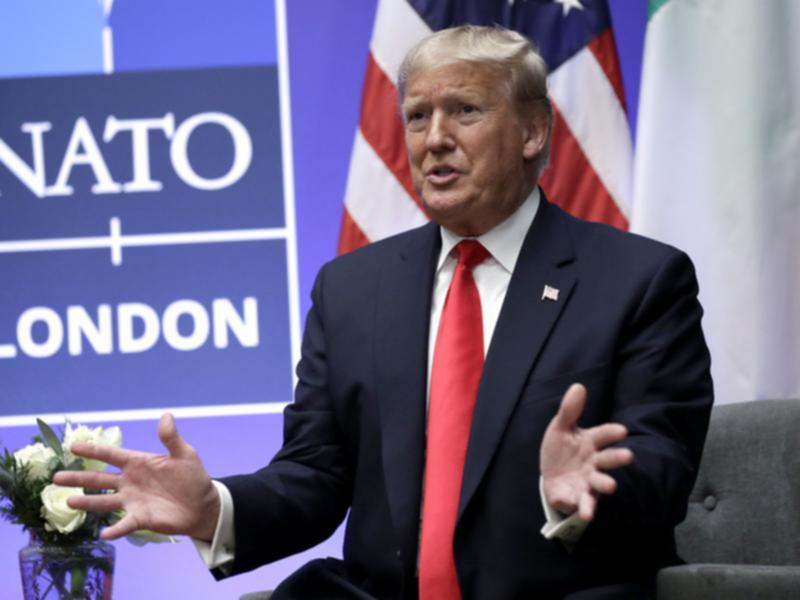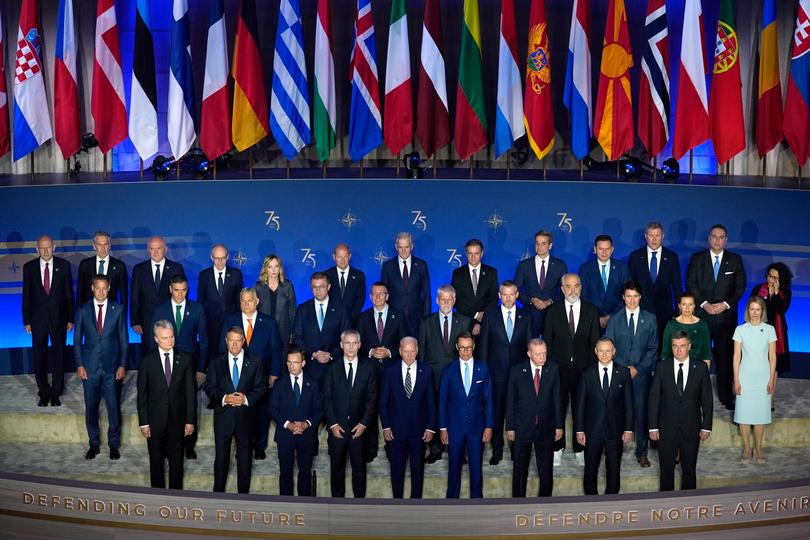NATO leaders move to ‘Trump-proof’ the alliance in Washington
Former president Donald Trump doesn’t have a seat at the table as NATO leaders gather this week in Washington, as officials strategise about how to adapt the alliance for the possibility that Trump may return.

Former president Donald Trump doesn’t have a seat at the table as NATO leaders gather this week in Washington, but he might as well, as officials strategise about how to adapt the alliance for the possibility that its most senior leader may soon again be a sceptic.
Alliance policymakers have moved control of major elements of military aid to Ukraine away from U.S. command to the NATO umbrella.
They appointed a new NATO secretary general who has a reputation as being especially agile with Trump’s unpredictable impulses towards the alliance.
Sign up to The Nightly's newsletters.
Get the first look at the digital newspaper, curated daily stories and breaking headlines delivered to your inbox.
By continuing you agree to our Terms and Privacy Policy.They are signing decade-long defence pledges with Ukraine to try to buffer military aid to Kyiv from the ups and downs of politics. And they are pushing up their defence spending, Trump’s single biggest anger point when it comes to NATO.
The gathered leaders on Wednesday agreed that they will support Ukraine “on its irreversible path to full Euro-Atlantic integration, including NATO membership” - wording that was subject to intense negotiation in recent weeks, with President Biden initially opposed to using the word “irreversible.”
Four nations also announced Wednesday that donated F-16 fighter jets to Ukraine will be operational later this summer. And alliance leaders called out China for being a “decisive enabler” of Russia’s war in Ukraine, its toughest language yet towards Beijing.
But for all the effort to strengthen the alliance, Trump’s shadow was casting a pall over Washington’s convention centre, where the summit is being held.
European leaders quietly wonder whether this is a goodbye to a U.S. president who hews to a transatlantic agenda - a bipartisan constant of U.S. foreign policy from World War II until Trump’s arrival in the White House in 2017.
“If we elect him a second time, then I think that’s, from the Europeans’ perspective, extraordinarily telling about our direction of travel in the United States,” said Andrea Kendall-Taylor, director of the transatlantic security program at the Center for a New American Security think tank.
“And so it is Trump-proofing for the most immediate four years, but there is a growing worry that the United States will be less committed to Europe over the longer term.”
Few European policymakers say they believe that Trump would formally pull the United States from NATO. Congress recently passed legislation that binds the country to the alliance and would require a two-thirds vote in the Senate to withdraw.
But many fear Trump would bring a far more transactional approach to the alliance, and some take seriously his vow that he would look at whether they are meeting their defence spending commitments before deciding whether to come to their aid if they are attacked.
How to handle Trump is dominating social conversations among NATO policymakers in Washington, along with the related obsession of whether Biden will drop his re-election effort.
NATO Secretary General Jens Stoltenberg on Wednesday downplayed concerns about a second Trump presidency.
“The main criticism from former president Trump, but also from other U.S. presidents, has not primarily been against NATO, it has been against NATO allies not investing enough in NATO - and that has changed,” he told reporters.
“The clear message has had an impact because now allies are really stepping up.”
Asked whether European leaders are talking about Trump behind closed doors, Norwegian Prime Minister Jonas Gahr Støre told The Washington Post in an interview that “you will not believe me if I said no.”

While in Washington, many leaders are taking the opportunity to have quiet conversations on the side with potential Trump administration foreign policy officials.
Keith Kellogg, the retired general who was then-Vice President Mike Pence’s national security adviser and continues to advise Trump, said last month that he had received 165 requests for briefings from foreign officials since November and that he had granted 100 of them.
Mr Kellogg noted that he doesn’t speak in an official capacity for Trump or the Trump campaign.
Many international policymakers - including Ukrainian leaders, who have the most to lose - have been hedging their bets against the possibility that Trump could return to office.
That was notable Tuesday in Ukrainian President Volodymyr Zelensky’s choice of venue to deliver a speech: the Reagan Institute, to a room of Republican luminaries and European diplomats.
Though he was careful not to comment directly about the U.S. election, Zelensky urged Biden to allow Ukraine to use U.S. long-range weaponry to strike military bases on Russian territory “and not to wait for November or any other event.”
Asked afterwards by Fox News anchor Bret Baier how closely he was watching the U.S. election, he said, “I think sometimes closer than you, Bret,” to laughter from the crowd.
Ukrainian leaders said that they hoped to float above the tumultuous U.S. presidential race, mindful of their role in Trump’s first impeachment, in 2019. As president, Trump had delayed defence aid to Ukraine while pressing for evidence of Biden’s alleged corruption in Kyiv.
“We don’t have to fit every political process. We have to make sure that we secure our survival from political processes,” Ukrainian Deputy Prime Minister Olha Stefanishyna said in an interview.

NATO policymakers have been deep in discussions for months about how to manage Trump’s revival. After Russia invaded Ukraine in February 2022, the Biden administration resisted a direct role for NATO in the provision of military aid to Kyiv, hoping to avoid Russian perceptions that the alliance was directly in battle with Moscow.
That reluctance has faded as Ukraine’s early heroics have been tempered by recent Russian battlefield gains. Meanwhile, Trump has surged in the polls and European concerns have grown.
NATO policymakers agreed in the lead-up to the summit to establish a new NATO command that would take on many of the coordination roles that the Pentagon had provided.
Policymakers quietly acknowledge that Trump-proofing the alliance can only go so far - not least because Trump is not the only leader who has questioned NATO policy towards Ukraine and Russia. Hungarian Prime Minister Viktor Orban and Slovakian Prime Minister Robert Fico have also backed similar policies.
Some leaders say a Trump presidency could be fine for NATO, especially if it pushes lagging European countries to spend more on their defence.
“What I say to Europeans all the time is: ‘Stop freaking out about Trump. You’ve done this before, you did this for four years, and guess what? It actually wasn’t that bad for Europe,’” said Rachel Rizzo, a non-resident senior fellow at the Atlantic Council’s Europe Center, in a briefing with reporters.
“There was some tough rhetoric and tough language that ruffled feathers certainly. But the policies that Trump put in place towards Europe were not damaging towards NATO.”
That spend-more effort has been endorsed by right-wing leaders in Europe who share many of Trump’s migration-septic policies and yet are also pro-Ukraine, such as Italian Prime Minister Giorgia Meloni and Polish President Andrzej Duda.
Trump and Duda “are friends. They understand their values. They understand credibility when it comes to the security obligations also,” said Jacek Siewiera, the head of Duda’s National Security Bureau.
Italy’s ambassador to the United States, Mariangela Zappia, said NATO’s core interests can withstand elections.
“I believe the NATO summit will be in fact a confirmation of how democratic systems can choose different paths but in the end stand together on principles: in this case, that borders cannot be changed through aggression,” she said.
Pro-NATO policymakers hope to manage splintering policy visions under the leadership of the incoming secretary general, Mark Rutte, who as a long-serving Dutch prime minister met repeatedly with Trump and became known for his tact in managing sometimes tense interactions.
That would put him in the tradition of Stoltenberg, who earned plaudits during the Trump era for finding ways to work with him.
“He made a very conscious decision to not pick a fight with the U.S. president, not to challenge him publicly or privately, and never to be caught talking about him,” said Camille Grand, a former NATO assistant secretary general who is now a distinguished policy fellow with the European Council on Foreign Relations.
Oana Lungescu, NATO’s spokesperson between 2010 and 2023 and now a distinguished fellow at the London-based Royal United Services Institute, said Stoltenberg’s team workshopped a single, easy-to-read graph that showed increases in European defence spending. The alliance also looked for ways to credit Trump for pushing allies to spend more.
“The figures were real - it’s about how you shape it and how you use it [to show] that this is achieving results, that NATO is a win,” she said.
Rutte, 57, spent 14 years wrangling political coalitions as prime minister of the Netherlands and is seen as a skilled and savvy diplomat with a frank, pragmatic style. Those who have worked with him say he is deeply committed to the transatlantic relationship and will do whatever it takes to protect it.
“He deeply believes in the power and strength of U.S.-European cooperation as a force to project Western values on the global stage, and he will speak up for that,” said a senior European official who has worked closely with him for years, speaking on the condition of anonymity to discuss sensitive issues.
In a now-famous 2018 interaction in the Oval Office, Rutte pointedly pushed back when Trump, delivering off-the-cuff remarks about trade, suggested it would be “positive” if the U.S. and Europe failed to reach a deal.
“No,” Rutte said, as Trump continued to speak. “It’s not positive,” Rutte continued, smiling. “We have to work something out.”
Trump shook his hand and moved on.
“Europe needs to step up regardless of the outcome of the U.S. election,” Swedish Foreign Minister Tobias Billström said in an interview. “We also have to take a greater responsibility for Ukraine, because Ukraine is in our backyard.”
- - -
Ellen Nakashima and Karen DeYoung contributed to this report.
© 2024 , The Washington Post
